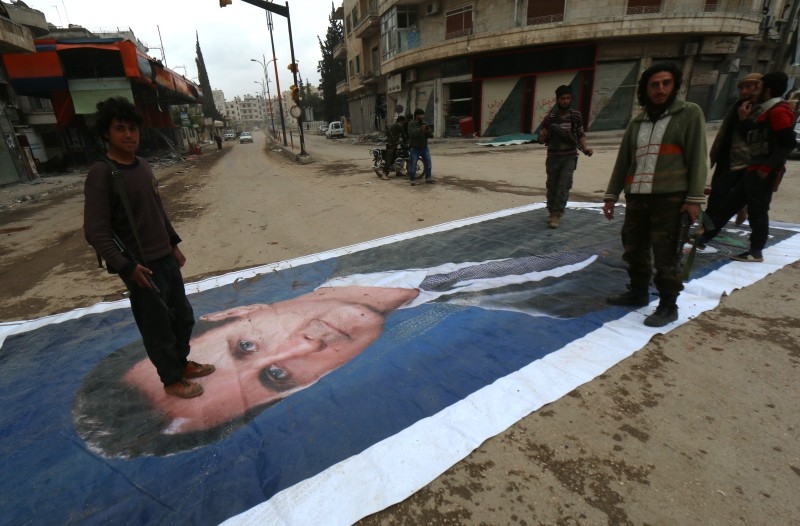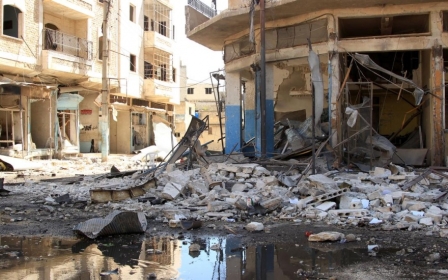ANALYSIS: Syrian rebel successes in Idlib could be game changer

The rebel seizure of Jisr al-Shughur in Syria's Idlib province on Monday – and the subsequent capture of the Al-Qarmid army base – challenges recent assumptions in some corners that Syrian President Bashar al-Assad was on the verge of reasserting control over the country.
The smashing of the opposition in Homs in 2014 had been seen as a major victory for the government, while the rise of Islamic State group (IS) led to in-fighting and splits among the opposition.
The introduction of US-led bombing raids into Syria, targeting Assad's enemies rather than the government, and a recent spate of image-building interviews in leading Western media outlets like the BBC and Foreign Affairs, had also reinforced the image of a resurgent statesman, rather than an embattled dictator.
But a series of military victories in Idlib province in recent weeks by a coalition of opposition forces encompassing many of Syria's myriad militias has forced many observers to think again.
The capture of Jisr al-Shughar in northwestern Syria marks a significant strategic loss for the Syrian government, cutting off a vital route between the pro-government stronghold of Latakia and Syria's fourth largest city, Hama.
The key Ghab Valley - which stretches between Hama in the south and Alawite-majority regions in the west - is now vulnerable to infiltration, said Joshua Landis, editor of Syria Comment and director of the University of Oklahoma's Center for Middle East Studies.
“If they can penetrate into those villages, they'll be able to surround Hama," Landis said.
Hama, he said, "has extraordinarily symbolic value, because its where the Assads pounded the Muslim Brotherhood in 1982 and killed so many people – and if they can take it, that will be a major morale booster."
Syria is thought to have hundreds of militias operating within its borders. But the success in Idlib province – which began with the seizing of the city of Idlib in late March – appears to have stemmed from a new level of organisation, cooperation and discipline among leading opposition groups, previously at one another's throats.
The rebel coalition that captured Jisr al-Shughur – which called itself “Battle for Victory” – saw coordination between al-Nusra Front, Ahrar al-Sham, Ansar Sham, Jaysh al-Islam, Jabhat Ansar al-Din and Junud al Sham among others.
The 'King Salman effect'
“We're also seeing, I think, the King Salman effect,” said Landis, referring to the new ruler of Saudi Arabia.
“The Saudi king has changed the priority of the kingdom. Under the previous king, the Muslim Brotherhood was the main enemy, not Iran.”
Landis told MEE that while the former King Abdullah had been in charge, the focus by Riyadh, and its ally the United Arab Emirates, on the Muslim Brotherhood as a source of instability and opposition in the region had undermined their ability to coordinate with other anti-Assad forces such as Qatar and Turkey.
“But today, King Salman has clearly changed Saudi Arabia's priorities, so that Iran and getting Iran is the most important thing and has prioritised it above attacking the Brotherhood,” said Landis.
He added that Saudi Arabia's intervention in Yemen against Shiite Houthi militias – which the kingdom continues to claim are primarily driven by Iranian interests and support – had further reinvigorated the Saudi desire to build a broad anti-Iran coalition and break its influence in Syria.
“Yemen is a big vulnerable spot for Saudi Arabia and Iran doesn't have to throw in much military aid in order to bleed Saudi Arabia in Yemen, because Yemen is a giant sinkhole for Saudi Arabia – but Syria is Iran's sinkhole.”
The result has been a shake up of what appeared to be strong Syrian government resolve to retake the reigns of powers.
“Assad's army is becoming weaker, it's becoming demoralised – so far Assad has been winning mainly due to the fragmentation of the other side and the lack of skill and experience on the other side,” said Randa Slim, director of the Track II Dialogues initiative at the Middle East Institute, based in the US.
“Now that these two factors on the opposition side have been addressed in some way, I think we are seeing the difference in the playing field," Slim said.
Increasingly stretched resources and the return of Iraqi Shiite militias to Iraq could prompt a rethink in the Syrian government strategy, which had previously envisioned breaking the opposition across all of Syria, she said.
“Until now, we have been seeing them contesting every place, but because of all these factors, there is a question that needs to be asked,” Slim told MEE. “Whether there is a plan B now that is being put in place, by Assad, by Iran, by Hezbollah, of deciding which part of Syria they can fight, they can hold. And we will see that, going forward.”
The question, she said, is whether – and when – the government will decide to cut its losses and begin focusing on areas of Syria, such as Damascus, which it cannot afford to lose, at the expense of areas like Idlib.
'Into the hands of al-Qaeda'
But while many have lauded the continuing takeover of Idlib province as a victory against Assad, other observers have become increasingly concerned by the ideological makeup of the rebel forces who have led the surge.
While they haven't hit the headlines in the same way that IS have, both al-Nusra Front, which declared allegiance to al-Qaeda leader Ayman al-Zawahiri in 2013, and Ahrar al-Sham, one of the biggest militias in northern Syria, have been accused of implementing draconian policies in areas under their control.
Aron Lund, editor of the Carnegie Endowment's Syria-in-Crisis, has argued that the differences between Nusra and Ahrar al-Sham are ultimately tactical rather than ideological.
“While there are important sources of friction between these two groups," Lund wrote in late March, "they are both overtly anti-democratic, hostile to religious minorities, and committed to establishing a Sunni Islamist theocracy in Syria."
“There is already great concern in the United States and Europe over the rise of jihadi groups in Syria. Now, early headlines in the Western press speak of a city that has 'fallen into the hands of al-Qaeda,' which is hardly the kind of coverage that Syrian rebels were looking for," he wrote.
Though there are still a variety of perspectives and ideologies within the Idlib coalition, the view of the fall of Idlib as a victory for “al-Qaeda” rather than the “opposition” has been a significant change of perception and has altered how many view the conflict.
"In a world that hadn’t completely lost its bearings, this would have been cause for great alarm and concerned action," wrote MEE's Aleppo-based columnist, Edward Dark, on Monday.
"Instead, it was barely a newsworthy event. Bizarrely, the majority of the Syrian opposition celebrated and welcomed it, without the slightest hint of appreciating the irony that, should they set foot inside those newly 'liberated' cities, they would likely be immediately executed by their new rulers."
Nusra and their allies have “fleshed out most of the moderate militias that America set up against them and they've consolidated Islamist power,” said Landis. “The US is not taking any interest in this.”
And its this viewpoint which will separate the US from regional funders moving forward, particularly as Turkey, Saudi Arabia and Qatar create a new "military equation" in Syria in which Nusra plays a role, Slim said.
"The US definitely considers this a terrorist organisation, but this is not a view necessarily shared by regional funders of the opposition.”
Stay informed with MEE's newsletters
Sign up to get the latest alerts, insights and analysis, starting with Turkey Unpacked
Middle East Eye delivers independent and unrivalled coverage and analysis of the Middle East, North Africa and beyond. To learn more about republishing this content and the associated fees, please fill out this form. More about MEE can be found here.




